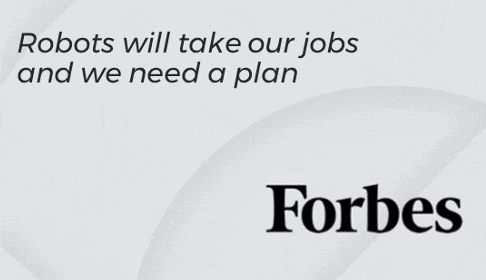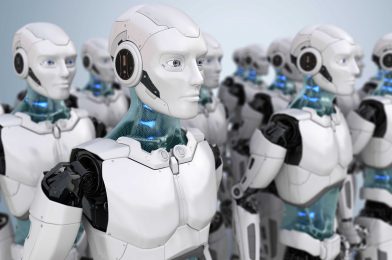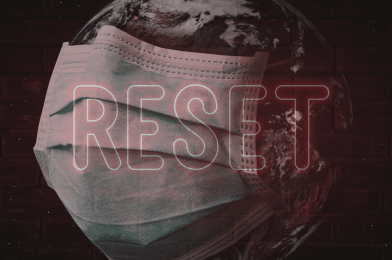The Great Reset is Here! It’s been planned for years. It’s no longer conspiracy theory. Time Magazine and the World Economic Forum have announced it to the world. Ignore it at your own peril. All that was needed was a crisis to kick it off and 2020 handed it to them on a silver platter. Many years from now society will look back on the 2020 shutdowns and see it as a turning point in history. Don’t let normalcy bias keep you from learning to survive in this new era.
The great reset is man-made, centrally planned and forced upon us at a speed never before seen in global history.
Other revolutions came about through the ingenuity of many people over time to solve various problems, increase productivity and improve quality of life. The great reset is man-made, centrally planned and forced upon us at a speed never before seen in global history.
Central planning is the worst way to solve problems. It’s the ego of those in power that causes them to think that governments can solve our problems. It’s the fallacy of entitled persons to believe government should take care of them. Governments and any very large entity that runs from the top down have the inherent issue that they are far removed from the actual problem. The further one is from the problem, the greater the odds of getting the solution incorrect. The larger the organization, the slower mistakes will be admitted and corrected. Worst of all, the larger the organization, the larger the mistake and the more damage that is done before it’s corrected.
The fundamental assumption of the great resetters is that capitalism is flawed and needs to “reimagined”. I’m not here to tell you that capitalism is the perfect system. There is no perfect system. What history has proven though is that it’s a far better system than any other that has been tried. Actually, the biggest problem resetters had was that capitalism was working too well. The United States was experiencing the greatest economy in the world. Not a great atmosphere to be promoting an alternative. Covid and the subsequent shutdowns fixed that little road block.
So there’s some backdrop, now what are we up against?
Three stated goals of the great reset:
- Steer the market toward fairer outcomes.
- Ensure investments advance shared goals (sustainability, equality)
- Harness innovations to support the public good.
On the surface, these are all very warm and fuzzy. Who wouldn’t want these things? (Evil capitalists of course!) Well, most politi-speak sounds good on the surface, it’s in the execution where it all goes wrong. People are flawed, biased and contrary to their own opinion, not omniscient. So just like any utopian endeavor, actual results never match up to the intended ones even with good intentions. Believe it or not, there are one or more persons out there with evil intentions too.
In business, not everyone get’s a trophy
Fairer outcomes. This is no doubt driven by the wealth gap. I’m not a wealth gap denier, it’s simple math. The question is how to deal with it assuming it needs to “dealt” with at all. Strictly speaking, someone else having more money than me is not an inherent problem no matter how bad it makes me feel. Digging a little deeper, this is more than just tax the rich. It’s change the system so they never get so rich in the first place. It’s a fundamental philosophy that states if two people venture out to start a business and one fails while the other gets absurdly rich, that’s just not “fair”. Yeah, it does kinda suck (for the first guy anyway), but removing the incentive for the second guy means the odds of him even trying are greatly reduced or eliminated. For every Steve Jobs, there are dozens if not hundreds of others that tried and failed. It doesn’t feel fair but is it better to have 1 Apple and 9 failures or no Apple and no failures? I’m sure all the happy iPhone users have the answer. Capitalism provides equal opportunity but not equal outcomes. Sorry, but in business not everyone gets a trophy. To the extent that something impedes access to equal opportunity, then I propose solutions would better be focused on that end of the equation.
Advancing shared goals. Who came up with these goals? People that know what’s better for all of us I guess. There’s only two ways for a global population to have shared goals. Either the goal is so basic and fundamental to human existence (food, clothing, shelter) or the “shared” goal is forced upon an unwitting people. You can guess where my bet is. Even with a legitimate shared goal though, implementation is again best determined locally. Not everyone experiences issues with basic human needs (or sustainability and equality) the same in every city and country so how can solutions be centrally planned? They can’t. Which is why they will just be forced. Anyone looking for startup capital for a new venture better be prepared to show how their business will advance these “shared” goals.
Harness
Verb – to control and make use of
Oxford English Dictionary
Harness innovations. Innovations come from the innovators. Do governments innovate anything? Well, anything useful? Hence the need for them to “harness” it from someone else. “We’re from the government and we’re here to help.” Do I even need to explain the ramifications of this? No worries here though, it will be for your own good.
Now that you know a bit about what the great reset is, what does it all mean? I’m not smart enough to have all the answers. If I was, I’d be on the central planning committee (ba-dup-ba). I’ll make a feeble attempt at predictions, feel free to make your own.
Great Reset Predictions:
- Commercial Real Estate is dead especially in large cities. As businesses tool for permanent remote workers, the need for office space will continually dwindle. The secondary effect, especially near concentrations of office space, will take out support businesses; nearby restaurants, cleaning services, office furniture, business attire, business travel, hotels.
- Remote working will skyrocket competition for jobs. No longer is the guy down the street the only competition. Remote positions can be worked anywhere. As competition for jobs increase, salaries will decrease and increase demands for a “living wage”.
- Socialism will march on (under the banner of fairness). The rich stay will rich and the poor will stay poor but the middle class will be destroyed. Poor people want to keep getting free stuff so they will continue to support it. The rich will keep influence and power no matter what (which ironically is one of the items they are supposedly against). The only ones left holding the bag are the middle class.
- Hyperinflation that used to only happen to those “mismanaged” third world countries will come home to roost in first world countries. This one is a hard one to pinpoint. It’s a total crap shoot on who will lose their citizens trust first. Every country is printing money like there is no tomorrow. So far the U.S. dollar has been the best of the worst. Who knows, it may continue for years. Just be aware it can come at anytime.
- Quality of healthcare will decrease. I pick this one out in particular since it’s so near and dear to Americans. There are certainly many problems with our current system, but overall we are so very spoiled by the level of healthcare available. We are also generally very sick. Obesity, diabetes, heart disease, depression, etc. Contrary to what the food and drug industry may tell us, so much of this is related to our diets and fitness level. It’s easy to ignore when you can pop into a doctor at any minute and get the pill or procedure of the day. When that luxury is gone, you’ll wish you took better care of yourself.
What does this mean for you?
- Income needs to be mobile.
- Assets needs to be liquid.
- Money needs to be portable.
- Skills need to be up to date.
- Health needs to be improved or maintained as best as you can.
My goal from here is to keep you as informed as I can and offer you tools that can help you in the above areas. Make sure to subscribe to get access to exclusive training not available here.
Good luck and God speed.






